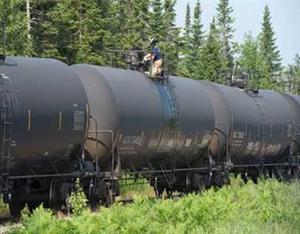Rail securityU.S. to require railroads to notify states when oil is shipped
With the increase in available oil from fracking and larger pipeline capacity, railways are moving more and more oil. Rail companies moved 400,000 oil carloads in 2013, dwarfing 2005’s 6,000 oil carloads. The increase in oil shipments of oil has led to an increase in the number of accidents involving oil tankers. In the wake of recent accidents, the U.S. Department of Transportation (DOT) has released an emergency order to railroad companies which is designed to reduce the risk when shipping crude oil across the nation.

Tanker train is not without hazard // Source: www.jagran.com
In the wake of recent accidents, the U.S. Department of Transportation (DOT) has released an emergency order to railroad companies which is designed to reduce the risk when shipping crude oil across the nation.
Bloomberg News reports that the order “requires railroads to notify state emergency agencies when they haul Bakken (North Dakota region) crude through communities. A separate advisory discourages carriers from using an older tank car known as the DOT-111 tided to some accidents, though the order doesn’t ban their use.”
Transportation secretary Anthony Foxx released a statement which said, “The safety of our nation’s railroad system, and the people who live along rail corridors is of paramount concern.”
This follows on the heels of recent disasters when transporting oil. In July of 2013, a train derailment in Lac-Megantic, Quebec and crude explosion led to mass destruction of the town and the deaths of forty-seven people. Additionally, on 30 April, an oil train derailed in Lynchburg, Virginia, following two similar instances in Philadelphia and a 21-car spill in North Dakota within the past six months.
Incidents like these have led lamakers such as Senator Maria Cantwell (D-Washington) to state that, “Requiring carriers to notify authorities about a train’s route wasn’t sufficient for residents.” Additionally, Brigham McCown, former head of the Pipeline and Hazardous Materials Safety Administration, told the news site, “Regulators should focus on why trains are derailing rather than on the sturdiness of the tank cars.”
The new order applies to trains carrying more than one million gallons, usually the equivalent to about thirty-five cars.
With the increase in available oil from fracking and larger pipeline capacity, railways “Moved 400,000 oil carloads in 2013, dwarfing 2005’s 6,000,” according to analyst Logan Purk, of Edward Jones & Co.
